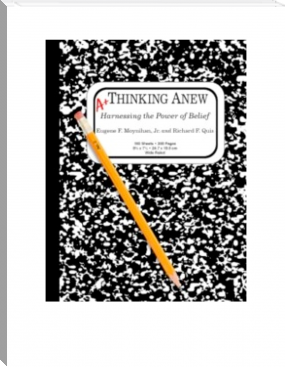Write It Right - Ambrose Bierce (a book to read txt) 📗

- Author: Ambrose Bierce
Book online «Write It Right - Ambrose Bierce (a book to read txt) 📗». Author Ambrose Bierce
Latin ear is far more offensive.
_Experience_ for _Suffer_, or _Undergo_. "The sinner experienced a change of heart." This will do if said lightly or mockingly. It does not indicate a serious frame of mind in the speaker.
_Extend_ for _Proffer_. "He extended an invitation." One does not always hold out an invitation in one's hand; it may be spoken or sent.
_Fail_. "He failed to note the hour." That implies that he tried to note it, but did not succeed. Failure carries always the sense of endeavor; when there has been no endeavor there is no failure. A falling stone cannot fail to strike you, for it does not try; but a marksman firing at you may fail to hit you; and I hope he always will.
_Favor_ for _Resemble_. "The child favors its father."
_Feel of_ for _Feel_. "The doctor felt of the patient's head." "Smell of" and "taste of" are incorrect too.
_Feminine_ for _Female_. "A feminine member of the club." Feminine refers, not to sex proper, but to gender, which may be defined as the sex of words. The same is true of masculine.
_Fetch_ for _Bring_. Fetching includes, not only bringing, but going to get--going for and returning with. You may bring what you did not go for.
_Finances_ for _Wealth_, or _Pecuniary Resources_.
_Financial_ for _Pecuniary_. "His financial reward"; "he is financially responsible," and so forth.
_Firstly_. If this word could mean anything it would mean firstlike, whatever that might mean. The ordinal numbers should have no adverbial form: "firstly," "secondly," and the rest are words without meaning.
_Fix_. This is, in America, a word-of-all-work, most frequently meaning repair, or prepare. Do not so use it.
_Forebears_ for _Ancestors_. The word is sometimes spelled forbears, a worse spelling than the other, but not much. If used at all it should be spelled _forebeers_, for it means those who have _been_ before. A forebe-er is one who fore-was. Considered in any way, it is a senseless word.
_Forecasted_. For this abominable word we are indebted to the weather bureau--at least it was not sent upon us until that affliction was with us. Let us hope that it may some day be losted from the language.
_Former_ and _Latter_. Indicating the first and the second of things previously named, these words are unobjectionable if not too far removed from the names that they stand for. If they are they confuse, for the reader has to look back to the names. Use them sparingly.
_Funeral Obsequies_. Tautological. Say, obsequies; the word is now used in none but a funereal sense.
_Fully_ for _Definitively_, or _Finally_. "After many preliminary examinations he was fully committed for trial." The adverb is meaningless: a defendant is never partly committed for trial. This is a solecism to which lawyers are addicted. And sometimes they have been heard to say "fullied."
_Funds_ for _Money_. "He was out of funds." Funds are not money in general, but sums of money or credit available for particular purposes.
_Furnish_ for _Provide_, or _Supply_. "Taxation furnished the money." A pauper may furnish a house if some one will provide the furniture, or the money to buy it. "His flight furnishes a presumption of guilt." It supplies it.
_Generally_ for _Usually_. "The winds are generally high." "A fool is generally vain." This misuse of the word appears to come of abbreviating: Generally speaking, the weather is bad. A fool, to speak generally, is vain.
_Gent_ for _Gentleman_. Vulgar exceedingly.
_Genteel_. This word, meaning polite, or well mannered, was once in better repute than it is now, and its noun, gentility, is still not infrequently found in the work of good writers. Genteel is most often used by those who write, as the Scotchman of the anecdote joked--wi' deeficulty.
_Gentleman_. It is not possible to teach the correct use of this overworked word: one must be bred to it. Everybody knows that it is not synonymous with man, but among the "genteel" and those ambitious to be thought "genteel" it is commonly so used in discourse too formal for the word "gent." To use the word gentleman correctly, be one.
_Genuine_ for _Authentic_, or _Veritable._ "A genuine document," "a genuine surprise," and the like.
_Given_. "The soldier was given a rifle." What was given is the rifle, not the soldier. "The house was given a coat (coating) of paint." Nothing can be "given" anything.
_Goatee_. In this country goatee is frequently used for a tuft of beard on the point of the chin--what is sometimes called "an imperial," apparently because the late Emperor Napoleon III wore his beard so. His Majesty the Goat is graciously pleased to wear his beneath the chin.
_Got Married_ for _Married_. If this is correct we should say, also, "got dead" for died; one expression is as good as the other.
_Gotten_ for _Got_. This has gone out of good use, though in such compounded words as begotten and misbegotten it persists respectably.
_Graduated_ for _Was Graduated_.
_Gratuitous_ for _Unwarranted_. "A gratuitous assertion." Gratuitous means without cost.
_Grueling_. Used chiefly by newspaper reporters; as, "He was subjected to a grueling cross-examination." "It was grueling weather." Probably a corruption of grilling.
_Gubernatorial_. Eschew it; it is not English, is needless and bombastic. Leave it to those who call a political office a "chair." "Gubernatorial chair" is good enough for them. So is hanging.
_Had Better_ for _Would Better_. This is not defensible as an idiom, as those who always used it before their attention was directed to it take the trouble to point out. It comes of such contractions as he'd for he would, I'd for I would. These clipped words are erroneously restored as "he had," "I had." So we have such monstrosities as "He had better beware," "I had better go."
_Hail_ for _Come_. "He hails from Chicago." This is sea speech, and comes from the custom of hailing passing ships. It will not do for serious discourse.
_Have Got_ for _Have_. "I have got a good horse" directs attention rather to the act of getting than to the state of having, and represents the capture as recently completed.
_Head over Heels_. A transposition of words hardly less surprising than (to the person most concerned) the mischance that it fails to describe. What is meant is heels over head.
_Healthy_ for _Wholesome_. "A healthy climate." "A healthy occupation." Only a living thing can be healthy.
_Helpmeet_ for _Helpmate_. In Genesis Adam's wife is called "an help meet for him," that is, fit for him. The ridiculous word appears to have had no other origin.
_Hereafter_ for _Henceforth_. Hereafter means at some time in the future; henceforth, always in the future. The penitent who promises to be good hereafter commits himself to the performance of a single good act, not to a course of good conduct.
_Honeymoon_. Moon here means month, so it is incorrect to say, "a week's honeymoon," or, "Their honeymoon lasted a year."
_Horseflesh_ for _Horses_. A singularly senseless and disagreeable word which, when used, as it commonly is, with reference to hippophilism, savors rather more of the spit than of the spirit.
_Humans_ as a Noun. We have no single word having the general yet limited meaning that this is sometimes used to express--a meaning corresponding to that of the word animals, as the word men would if it included women and children. But there is time enough to use two words.
_Hung_ for _Hanged_. A bell, or a curtain, is hung, but a man is hanged. Hung is the junior form of the participle, and is now used for everything but man. Perhaps it is our reverence for the custom of hanging men that sacredly preserves the elder form--as some, even, of the most zealous American spelling reformers still respect the u in Saviour.
_Hurry_ for _Haste_ and _Hasten_. To hurry is to hasten in a more or less disorderly manner. Hurry is misused, also, in another sense: "There is no hurry"--meaning, There is no reason for haste.
_Hurt_ for _Harm_. "It does no hurt." To be hurt is to feel pain, but one may be harmed without knowing it. To spank a child, or flout a fool, hurts without harming.
_Idea_ for _Thought_, _Purpose_, _Expectation_, etc. "I had no idea that it was so cold." "When he went abroad it was with no idea of remaining."
_Identified with_. "He is closely identified with the temperance movement." Say, connected.
_Ilk_ for _Kind_. "Men of that ilk." This Scotch word has a narrowly limited and specific meaning. It relates to an ancestral estate having the same name as the person spoken of. Macdonald of that ilk means, Macdonald of Macdonald. The phrase quoted above is without meaning.
_Illy_ for _Ill_. There is no such word as illy, for ill itself is an adverb.
_Imaginary Line_. The adjective is needless. Geometrically, every line is imaginary; its graphic representation is a mark. True the text-books say, draw a line, but in a mathematical sense the line already exists; the drawing only makes its course visible.
_In_ for _Into_. "He was put in jail." "He went in the house." A man may be in jail, or be in a house, but when the act of entrance--the movement of something from the outside to the inside of another thing--is related the correct word is into if the latter thing is named.
_Inaugurate_ for _Begin_, _Establish_, etc. Inauguration implies some degree of formality and ceremony.
_Incumbent_ for _Obligatory_. "It was incumbent upon me to relieve him." Infelicitous and work-worn. Say, It was my duty, or, if enamored of that particular metaphor, It lay upon me.
_Individual_. As a noun, this word means something that cannot be considered as divided, a unit. But it is incorrect to call a man, woman or child an individual, except with reference to mankind, to society or to a class of persons. It will not do to say, "An individual stood in the street," when no mention nor allusion has been made, nor is going to be made, to some aggregate of individuals considered as a whole.
_Indorse_. See _Endorse_.
_Insane Asylum_. Obviously an asylum cannot be unsound in mind. Say, asylum for the insane.
_In Spite of_. In most instances it is better to say despite.
_Inside of_. Omit the preposition.
_Insignificant_ for _Trivial_, or _Small_. Insignificant means not signifying anything, and should be used only in contrast, expressed or implied, with something that is important for what it implies. The bear's tail may be insignificant to a naturalist tracing the animal's descent from an earlier species, but to the rest of us, not concerned with the matter, it is merely small.
_Insoluble_ for _Unsolvable_. Use the former word for material substances, the latter for problems.
_Inst._, _Prox._, _Ult._ These abbreviations of _instante mense_ (in the present month), _proximo mense_ (in the next month) and _ultimo mense_ (in the last month), are serviceable enough in commercial correspondence, but, like A.M., P.M. and many other contractions of Latin words, could profitably be spared from literature.
_Integrity_ for _Honesty_. The word means entireness, wholeness. It may be rightly used to affirm possession of all the virtues, that is, unity of moral character.
_Involve_ for _Entail_. "Proof of the charges will involve his dismissal." Not at all; it will entail it. To involve is, literally, to infold, not to bring about, nor cause to ensue. An unofficial investigation, for example, may involve character and reputation, but the ultimate consequence is entailed. A question, in the parliamentary sense, may involve a principle; its settlement one way or another may entail expense,
_Experience_ for _Suffer_, or _Undergo_. "The sinner experienced a change of heart." This will do if said lightly or mockingly. It does not indicate a serious frame of mind in the speaker.
_Extend_ for _Proffer_. "He extended an invitation." One does not always hold out an invitation in one's hand; it may be spoken or sent.
_Fail_. "He failed to note the hour." That implies that he tried to note it, but did not succeed. Failure carries always the sense of endeavor; when there has been no endeavor there is no failure. A falling stone cannot fail to strike you, for it does not try; but a marksman firing at you may fail to hit you; and I hope he always will.
_Favor_ for _Resemble_. "The child favors its father."
_Feel of_ for _Feel_. "The doctor felt of the patient's head." "Smell of" and "taste of" are incorrect too.
_Feminine_ for _Female_. "A feminine member of the club." Feminine refers, not to sex proper, but to gender, which may be defined as the sex of words. The same is true of masculine.
_Fetch_ for _Bring_. Fetching includes, not only bringing, but going to get--going for and returning with. You may bring what you did not go for.
_Finances_ for _Wealth_, or _Pecuniary Resources_.
_Financial_ for _Pecuniary_. "His financial reward"; "he is financially responsible," and so forth.
_Firstly_. If this word could mean anything it would mean firstlike, whatever that might mean. The ordinal numbers should have no adverbial form: "firstly," "secondly," and the rest are words without meaning.
_Fix_. This is, in America, a word-of-all-work, most frequently meaning repair, or prepare. Do not so use it.
_Forebears_ for _Ancestors_. The word is sometimes spelled forbears, a worse spelling than the other, but not much. If used at all it should be spelled _forebeers_, for it means those who have _been_ before. A forebe-er is one who fore-was. Considered in any way, it is a senseless word.
_Forecasted_. For this abominable word we are indebted to the weather bureau--at least it was not sent upon us until that affliction was with us. Let us hope that it may some day be losted from the language.
_Former_ and _Latter_. Indicating the first and the second of things previously named, these words are unobjectionable if not too far removed from the names that they stand for. If they are they confuse, for the reader has to look back to the names. Use them sparingly.
_Funeral Obsequies_. Tautological. Say, obsequies; the word is now used in none but a funereal sense.
_Fully_ for _Definitively_, or _Finally_. "After many preliminary examinations he was fully committed for trial." The adverb is meaningless: a defendant is never partly committed for trial. This is a solecism to which lawyers are addicted. And sometimes they have been heard to say "fullied."
_Funds_ for _Money_. "He was out of funds." Funds are not money in general, but sums of money or credit available for particular purposes.
_Furnish_ for _Provide_, or _Supply_. "Taxation furnished the money." A pauper may furnish a house if some one will provide the furniture, or the money to buy it. "His flight furnishes a presumption of guilt." It supplies it.
_Generally_ for _Usually_. "The winds are generally high." "A fool is generally vain." This misuse of the word appears to come of abbreviating: Generally speaking, the weather is bad. A fool, to speak generally, is vain.
_Gent_ for _Gentleman_. Vulgar exceedingly.
_Genteel_. This word, meaning polite, or well mannered, was once in better repute than it is now, and its noun, gentility, is still not infrequently found in the work of good writers. Genteel is most often used by those who write, as the Scotchman of the anecdote joked--wi' deeficulty.
_Gentleman_. It is not possible to teach the correct use of this overworked word: one must be bred to it. Everybody knows that it is not synonymous with man, but among the "genteel" and those ambitious to be thought "genteel" it is commonly so used in discourse too formal for the word "gent." To use the word gentleman correctly, be one.
_Genuine_ for _Authentic_, or _Veritable._ "A genuine document," "a genuine surprise," and the like.
_Given_. "The soldier was given a rifle." What was given is the rifle, not the soldier. "The house was given a coat (coating) of paint." Nothing can be "given" anything.
_Goatee_. In this country goatee is frequently used for a tuft of beard on the point of the chin--what is sometimes called "an imperial," apparently because the late Emperor Napoleon III wore his beard so. His Majesty the Goat is graciously pleased to wear his beneath the chin.
_Got Married_ for _Married_. If this is correct we should say, also, "got dead" for died; one expression is as good as the other.
_Gotten_ for _Got_. This has gone out of good use, though in such compounded words as begotten and misbegotten it persists respectably.
_Graduated_ for _Was Graduated_.
_Gratuitous_ for _Unwarranted_. "A gratuitous assertion." Gratuitous means without cost.
_Grueling_. Used chiefly by newspaper reporters; as, "He was subjected to a grueling cross-examination." "It was grueling weather." Probably a corruption of grilling.
_Gubernatorial_. Eschew it; it is not English, is needless and bombastic. Leave it to those who call a political office a "chair." "Gubernatorial chair" is good enough for them. So is hanging.
_Had Better_ for _Would Better_. This is not defensible as an idiom, as those who always used it before their attention was directed to it take the trouble to point out. It comes of such contractions as he'd for he would, I'd for I would. These clipped words are erroneously restored as "he had," "I had." So we have such monstrosities as "He had better beware," "I had better go."
_Hail_ for _Come_. "He hails from Chicago." This is sea speech, and comes from the custom of hailing passing ships. It will not do for serious discourse.
_Have Got_ for _Have_. "I have got a good horse" directs attention rather to the act of getting than to the state of having, and represents the capture as recently completed.
_Head over Heels_. A transposition of words hardly less surprising than (to the person most concerned) the mischance that it fails to describe. What is meant is heels over head.
_Healthy_ for _Wholesome_. "A healthy climate." "A healthy occupation." Only a living thing can be healthy.
_Helpmeet_ for _Helpmate_. In Genesis Adam's wife is called "an help meet for him," that is, fit for him. The ridiculous word appears to have had no other origin.
_Hereafter_ for _Henceforth_. Hereafter means at some time in the future; henceforth, always in the future. The penitent who promises to be good hereafter commits himself to the performance of a single good act, not to a course of good conduct.
_Honeymoon_. Moon here means month, so it is incorrect to say, "a week's honeymoon," or, "Their honeymoon lasted a year."
_Horseflesh_ for _Horses_. A singularly senseless and disagreeable word which, when used, as it commonly is, with reference to hippophilism, savors rather more of the spit than of the spirit.
_Humans_ as a Noun. We have no single word having the general yet limited meaning that this is sometimes used to express--a meaning corresponding to that of the word animals, as the word men would if it included women and children. But there is time enough to use two words.
_Hung_ for _Hanged_. A bell, or a curtain, is hung, but a man is hanged. Hung is the junior form of the participle, and is now used for everything but man. Perhaps it is our reverence for the custom of hanging men that sacredly preserves the elder form--as some, even, of the most zealous American spelling reformers still respect the u in Saviour.
_Hurry_ for _Haste_ and _Hasten_. To hurry is to hasten in a more or less disorderly manner. Hurry is misused, also, in another sense: "There is no hurry"--meaning, There is no reason for haste.
_Hurt_ for _Harm_. "It does no hurt." To be hurt is to feel pain, but one may be harmed without knowing it. To spank a child, or flout a fool, hurts without harming.
_Idea_ for _Thought_, _Purpose_, _Expectation_, etc. "I had no idea that it was so cold." "When he went abroad it was with no idea of remaining."
_Identified with_. "He is closely identified with the temperance movement." Say, connected.
_Ilk_ for _Kind_. "Men of that ilk." This Scotch word has a narrowly limited and specific meaning. It relates to an ancestral estate having the same name as the person spoken of. Macdonald of that ilk means, Macdonald of Macdonald. The phrase quoted above is without meaning.
_Illy_ for _Ill_. There is no such word as illy, for ill itself is an adverb.
_Imaginary Line_. The adjective is needless. Geometrically, every line is imaginary; its graphic representation is a mark. True the text-books say, draw a line, but in a mathematical sense the line already exists; the drawing only makes its course visible.
_In_ for _Into_. "He was put in jail." "He went in the house." A man may be in jail, or be in a house, but when the act of entrance--the movement of something from the outside to the inside of another thing--is related the correct word is into if the latter thing is named.
_Inaugurate_ for _Begin_, _Establish_, etc. Inauguration implies some degree of formality and ceremony.
_Incumbent_ for _Obligatory_. "It was incumbent upon me to relieve him." Infelicitous and work-worn. Say, It was my duty, or, if enamored of that particular metaphor, It lay upon me.
_Individual_. As a noun, this word means something that cannot be considered as divided, a unit. But it is incorrect to call a man, woman or child an individual, except with reference to mankind, to society or to a class of persons. It will not do to say, "An individual stood in the street," when no mention nor allusion has been made, nor is going to be made, to some aggregate of individuals considered as a whole.
_Indorse_. See _Endorse_.
_Insane Asylum_. Obviously an asylum cannot be unsound in mind. Say, asylum for the insane.
_In Spite of_. In most instances it is better to say despite.
_Inside of_. Omit the preposition.
_Insignificant_ for _Trivial_, or _Small_. Insignificant means not signifying anything, and should be used only in contrast, expressed or implied, with something that is important for what it implies. The bear's tail may be insignificant to a naturalist tracing the animal's descent from an earlier species, but to the rest of us, not concerned with the matter, it is merely small.
_Insoluble_ for _Unsolvable_. Use the former word for material substances, the latter for problems.
_Inst._, _Prox._, _Ult._ These abbreviations of _instante mense_ (in the present month), _proximo mense_ (in the next month) and _ultimo mense_ (in the last month), are serviceable enough in commercial correspondence, but, like A.M., P.M. and many other contractions of Latin words, could profitably be spared from literature.
_Integrity_ for _Honesty_. The word means entireness, wholeness. It may be rightly used to affirm possession of all the virtues, that is, unity of moral character.
_Involve_ for _Entail_. "Proof of the charges will involve his dismissal." Not at all; it will entail it. To involve is, literally, to infold, not to bring about, nor cause to ensue. An unofficial investigation, for example, may involve character and reputation, but the ultimate consequence is entailed. A question, in the parliamentary sense, may involve a principle; its settlement one way or another may entail expense,
Free e-book «Write It Right - Ambrose Bierce (a book to read txt) 📗» - read online now
Similar e-books:





Comments (0)